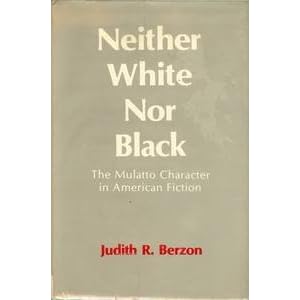Neither White Nor Black: The Mulatto Character in American FictionPosted in Books, Literary/Artistic Criticism, Media Archive, Monographs, Passing, United Kingdom on 2011-09-18 04:40Z by Steven |
Neither White Nor Black: The Mulatto Character in American Fiction
New York University Press
1978
280 pages
ISBN-10: 0814709966; ISBN-13: 978-0814709962
9 x 6 x 1 inches
This book is out of print.
Judith R. Berzon

The mulatto character has captured the imagination of American novelist in every period of our literature. For American writers, the mulatto has long signified a “marginal man,” caught between two cultures and between the boundaries of the American caste system. As such, the mulatto’s biological and psychological responses to his status—attraction and repulsion to both the white an non-white castes—have frequently been fictionalized.
Neither White Nor Black is the first comprehensive study of the mulatto character in American fiction. It is interdisciplinary in approach, drawing from literature, history, sociology, psychology and biology, and assessing the influence of racist ideology, social mythology and historical reality upon the portrayal of the mulatto character. Dr. Berzon examines how the self-concepts of mixed-blood characters are affected by black-white mythology and explores the roles mulattoes have played in American culture. Among the 19th an 20th-century black and white authors examined here are Mark Twain, William Faulkner, Robert Penn Warren and John A. Williams.
In Part I of the book, Dr. Berzon provides an introduction to the historical, sociological and scientific backgrounds of the fiction; an overview of the novels; and a discussion of the most prevalent sterotype—“the tragic mulatto.” Part II defines and illustrates the forms of adjustment to marginality. Each chapter is organized around a specific mode of adjustment—passing for white, becoming a member of the black bourgeosie, working as leader of his/her race, and failing to achieve identification with either the white or black group. In the Postscript, Dr. Berzon examines three novels of the 1970s by important black authors—John A. Williams, Ernest J. Gaines, and John Oliver Killens. Her study is enriched by the recently published but crucial historical scholarship such as Roll, Jordan Roll by Eguene Genovese, White Over Black by Winthrop Jordan, an The Black Image in the White Mind by George Fredrickson, as well as the earlier work by Addison Gayle Jr., The Black Aesthetic.
In Neither White Nor Black, Dr. Berzon reveals the recurring themes in the portrayal of the mulatto character throughout several periods of the 19th and 20th-century American history. Central to the portrayal of the mulatto during all these periods is the quest for identity, and Dr. Berzon, through her illuminating analysis, provides her readers, whether students of Black studies, American studies, Southern history, literature, or intellectual history, with an essential understanding of that quest and of the role of the mulatto in American society.